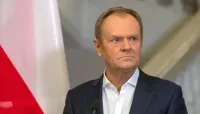Europe scrambles for Plan B to fund Ukraine as Belgium blocks Russian asset seizure
global.espreso.tv
Mon, 27 Oct 2025 18:00:00 +0200

Politico reported the information.The joint debt option is expected to be included in a European Commission paper to be presented to EU capitals in the coming weeks, alongside the controversial reparation loan proposal and a third option of cutting Ukraine loose—though diplomats say only Hungary would support abandoning Kyiv.Several EU leaders floated the joint borrowing plan during last Thursday's European Council summit as it became clear Belgium would not lift its objections to using Russian frozen assets stored with Brussels-based Euroclear, according to three EU diplomats who spoke on condition of anonymity.The prospect of EU countries—many already carrying heavy debt burdens—having to borrow more to support Ukraine is expected to intensify pressure on member states to find a solution. Ukraine faces serious financial difficulties by the end of the first quarter of 2026 without a fresh cash injection, and Europe is currently the only credible source of funding.The looming deadline means the Commission must produce its option papers immediately, with leaders needing to make a final decision no later than the December 18 European Council summit. EU ambassadors are scheduled to discuss the fallout from last week's impasse at a meeting on Wednesday.Despite the risks of raising additional debt, two diplomats emphasized that most EU countries still view using Russia's frozen assets as the "most preferred" option. Joint debt was likely presented as a "scarecrow" to pressure reluctant countries into action."What's the point of discussing alternative solutions? This [the reparation loan] is the only thing that we have," said a fourth diplomat. "And we should be honest about it."Poor timing may have contributed to Thursday's failure. Belgian Prime Minister Bart De Wever, currently navigating difficult budget negotiations at home, only received the Commission's latest legal proposal for the reparation loan on the morning of the summit, two diplomats said. Under those circumstances, it was unrealistic to expect him to immediately approve something that could expose Belgium to significant financial liabilities.The situation echoes 2023, when Hungary vetoed Ukraine financing before stepping aside at the last minute, allowing a €50 billion loan package to pass in February 2024. However, the U.S. was still providing monetary aid to Ukraine at that time.The EU has previously honored its commitments to support Kyiv, but this time the challenge appears more formidable given the absence of other major financial backers and the fact that some large EU countries—particularly France—now face serious budgetary constraints. The reparation loan also represents uncharted territory for the bloc, suggesting more turbulence lies ahead.






